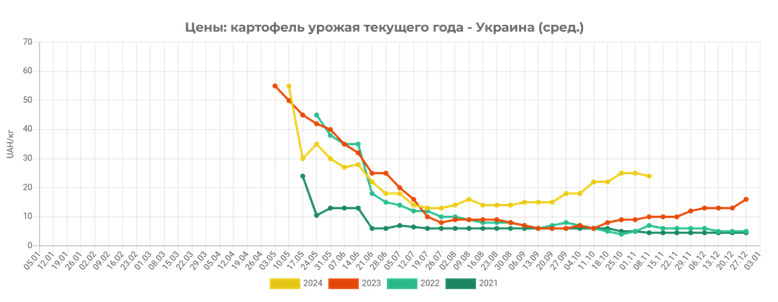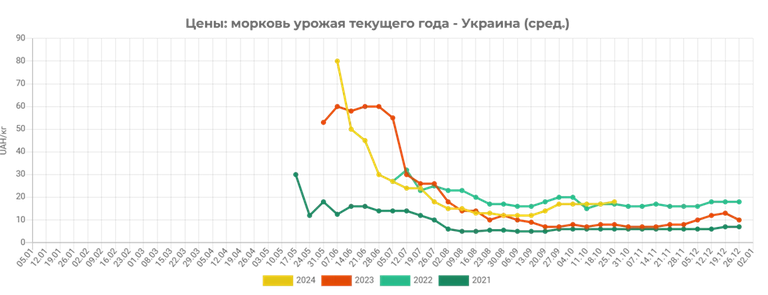
Ukrainian farmers are forced to reduce selling prices for onions this week, according to analysts of the EastFruit project. According to market participants, the negative price trend is caused by several factors at once. First of all, the demand for onions has fallen significantly. At the same time, the supply of onions on the market has increased significantly. Small farms began to actively sell out of unequipped storage facilities and are ready to make concessions in the hope to realize the available volumes before the onset of frost.

To date, Ukrainian producers are ready to ship onions in the range of UAH 8-14/kg ($0.19-0.34/kg), depending on the quality and volume of products, which is on average 13% cheaper than at the end of last week.
Producers of these vegetables report a noticeable weakening of demand for onions, while supply on the market continues to increase. The increase in supply is due to the desire of farmers to get rid of substandard onions as soon as possible. At the same time, the demand for such products remains relatively low, mainly such onions are purchased by chains and resellers for current sales, as they are practically unsuitable for long-term storage.
It should be noted that today onions in Ukraine are already on sale on average 20% cheaper than in the same period last year. We would like to add that according to market participants, it is quite difficult to buy quality onions at the moment, as many producers have put such products in storage and plan to sell them only in the second half of the current season.
You can get more detailed information about the market development of onions and other horticultural products in Ukraine by subscribing to the operative analytical weekly – EastFruit Ukraine Weekly Pro. Detailed information about the product can be found here.

Prices for greenhouse cucumbers in Ukraine continue to rise rapidly for the fifth week in a row, according to analysts of the EastFruit project. The fixed positive price trend is associated with a further reduction in the supply of local products due to the seasonal factor, against the background of stable demand from retail and wholesale buyers.
According to the weekly monitoring of the project, today the majority of large greenhouse plants in Ukraine have already announced the actual end of the season of sales of cucumbers of the last turnover. At the moment, only a few farms are selling, and the quality of the offered products is often very low.

As of today, wholesale batches of greenhouse cucumbers in Ukraine go on sale at UAH 100-125/kg ($2.42-3.02/kg), which is on average 11% more expensive than a week earlier. According to market operators, the supply of imported vegetables at the moment cannot fully cover all the requests of buyers, which does not contribute to stabilization of the price situation in this segment.
It should be noted that at the moment Ukrainian factories already manage to ship cucumbers on average 72% more expensive than in the same period last year. At the same time, market participants are confident that the price growth in this segment may continue in the near future, as only new volume supplies of imported greenhouse vegetables to the domestic market can lead to a change in the current situation.
You can get more detailed information about the development of the market of greenhouse cucumbers and other horticultural products in Ukraine by subscribing to the analytical weekly EastFruit Ukraine Weekly Pro. Detailed information about the product can be found here.
https://east-fruit.com/novosti/pyat-nedel-podryad-v-ukraine-dorozhayut-ogurtsy/

In Ukraine, prices for potatoes have started to gradually decline, analysts of the EastFruit project report. It should be noted that a week earlier sellers managed to keep selling prices at a fairly high level, but the activity of trade gradually decreased. It became obvious to producers that at the established price level it will be extremely difficult to realize the volumes of potatoes, especially those that are not suitable for further storage, before the onset of frost. As a result, most of them by the middle of this week began to synchronously reduce selling prices, trying to revive the interest of wholesalers to their goods.

Thus, at the moment farmers in the main regions of production are ready to ship quality potatoes at 18-28 UAH/kg ($0.43-0.68/kg), depending on the volume and quality of products offered, which is on average 10% cheaper than at the end of last week.
At the same time, wholesale companies, many of which succumbed to the hype in this segment, and having in stock volumes of expensive potatoes purchased on the external market earlier, are currently selling excessive quantities at a loss.
At the same time, owners of quality potatoes today prefer not to hurry with the realization of available volumes of their products, waiting for the improvement of the price situation in the market. It should be added that under the current conditions, potato prices in the Ukrainian market at the moment are still on average 2.3 times higher than in early November last year.
More detailed information about the development of the market of potatoes and other horticultural products in Ukraine you can get by subscribing to the operative analytical weekly – EastFruit Ukraine Weekly Pro. Detailed information about the product can be found here.
https://east-fruit.com/novosti/v-ukraine-desheveet-kartofel-2/

Global Build Engineering (Ternopil), Spets-Bud Standard (Ternopil region) and Uniontransbuilding (Lutsk) have received permission from the Antimonopoly Committee of Ukraine to create a consortium called Global Roads Group. The relevant decision on granting permission for concerted actions of the companies was made by the Antimonopoly Committee of Ukraine on October 31.
According to Opendatabot, the owner and beneficiary of Global Build Engineering LLC is Serhiy Tolstikov. The company is engaged in the construction of residential and non-residential buildings, roads and highways.
According to the financial results for 2023, “Global Build Engineering” reduced net income by 32% – to UAH 45 million, while increasing net profit threefold – to UAH 340 thousand.
Petr Zemba is the owner and ultimate beneficiary of Spets-Bud Standard LLC. The main type of activity is road construction. According to the results of 2023, the net income of the company increased by 24% – to UAH 67 million, while net profit decreased 11 times – to UAH 14.2 thousand.
The owner of Uniontransbuilding LLC is listed as Andriy Podosovsky. The company is also engaged in the construction of buildings. According to the results of 2023, the company increased net income 3.8 times – up to UAH 186 million, net profit – four times, up to UAH 2.7 million.

On November 1, 2024, Ukraine started the season of natural gas withdrawal from its underground gas storage facilities (UGS), according to the data of the Association of European Underground Gas Storage Operators (GSE). While on October 30 and 31 a small filling of storage facilities was recorded, on November 1 the volume of their filling decreased by 0.05%.
On October 31, the head of Naftohaz, Oleksiy Chernyshov, stated on his Facebook page that the heating season was actively starting in Ukrainian cities.
He recalled that Ukraine used about 6.7 billion cubic meters of gas from its subway gas reservoirs during the 2023/2024 heating season, and expects the same figures for the 2024/2025 season.
As reported, Ukraine entered November 2023 with 16 billion cubic meters of gas stored in UGS facilities. In general, during the heating season 2023/24, 8.5 billion cubic meters of natural gas was withdrawn from storage facilities, of which Ukraine used 6.7 billion cubic meters. The gas withdrawal season lasted a total of 145 days.
Ukraine planned to enter the heating season of 2024/25 with gas reserves in UGS at least 13 billion cubic meters. At the same time, the low activity of gas injection by non-residents forced Naftohaz to buy gas and store it in Ukraine’s UGS facilities in the “customs warehouse” (CU) mode,
Chernyshov noted in his commentary to Energoreforma in early October that as of November 1, the company’s purchase of gas in the TC mode, which is carried out as a reserve at the expense of the EBRD loan, will amount to about 0.5-0.6 billion cubic meters.
According to former Energy Minister Olga Buslavets, in general, the reserves in Ukraine’s UGS facilities as of November 1, 2024 amounted to 12.9 billion cubic meters.
natural gas withdrawal, UKRAINE, underground storage facilities

Increased trade activity stimulates the growth of prices for carrots in Ukrainian farms, according to analysts of the EastFruit project. According to the producers themselves, at the moment this root vegetable is actively purchased by both wholesale companies, which put it in storage, and the population, which forms stocks for the winter. In addition, sales to retail chains remain quite stable.

Today, farmers in the main regions of production ship quality carrots at 18-25 UAH/kg ($0.16-0.22/kg), which is on average 12% more expensive than at the end of last week. However, industry experts emphasize that the trend of price growth is observed only in the segment of high quality carrots, which are purchased for storage.
It should be noted that at the moment prices for quality carrots in Ukraine are already on average 3.3 times higher than in the same period last year. At the same time, some producers plan to further increase prices for carrots, provided the current sales rates are maintained.
You can get more detailed information about the development of carrots and other fruit and vegetable products market in Ukraine by subscribing to the operative analytical weekly – EastFruit Ukraine Weekly Pro. Detailed product information is available here.
https://east-fruit.com/novosti/v-ukraine-rastut-tseny-na-kachestvennuyu-morkov/